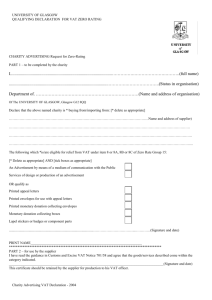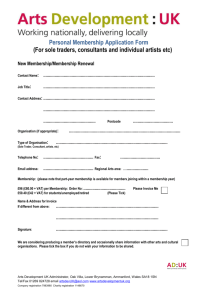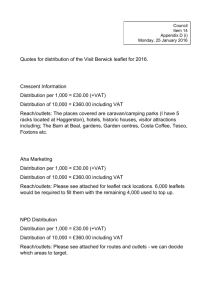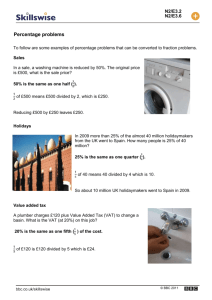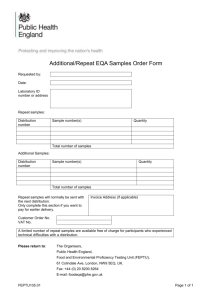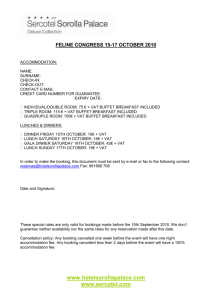Union finance and accounts
advertisement
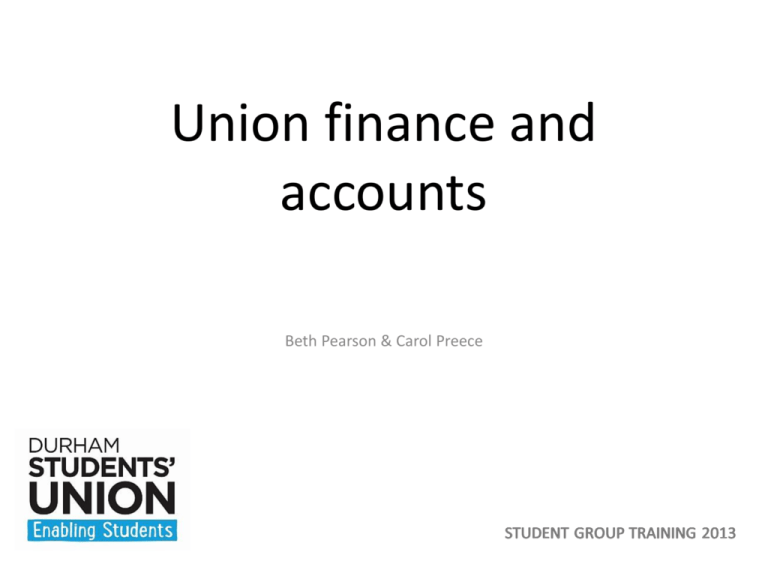
Union finance and accounts Beth Pearson & Carol Preece What do you want to get out of this session? By the end of this session . . . • • • • • • • Treasurer responsibilities Charity Law VAT Budgeting Grant allocation and Sponsorship Union forms and things Finance and the website Being a treasurer . . . . • • • • • • • Ensure the smooth running of the society/project Prepare and maintain budgets for the year/events Keep track of incomings and outgoings Check weekly statement Apply for funding Inventory of equipment Handover Legal Bits Charity Law • Union expenditure must further the interests of the students in a way that assists in the educational aims of the university. This includes providing facilities for recreation and leisure. • Prevented from the use of the union's funds for purposes which are outside the objects of the charity. – • • • • There is no objection to students joining together to collect their own funds for any purpose for which union funds cannot be used. All members must equally benefit from activities. Members of a charity cannot be beneficiaries. Cannot give money away, cannot donate money unless collected for that express purpose. Accounts must be submitted to Companies House, Charity Commision, Durham University. The latter of the two check we operate within the law. Company Law • Only allowed to operate within the boundaries the company was created for. Spend money in furtherance of societies objectives and the Unions charitable objectives. The Students’ Union Objects The Union's charitable objects are the advancement of education of Students at Durham University for the public benefit by: – providing opportunities for the expression of Student opinion and actively representing the interest of Students; – acting as a channel of communication in dealing with Durham University and other external bodies; – promoting the interests and welfare of Students at Durham University during their course of study, and representation, supporting and advising Students; – facilitating the social, recreational and educational interests of its Membership, through providing services and support for its Members; – supporting the development of and cooperation between the Common Rooms; – working with other Students' Unions and affiliated bodies; and raising funds for such purposes as are charitable according to the laws of England and Wales and to make grants and donations of such funds to other of such funds to other exclusively charitable bodies or to apply such funds directly for such charitable purposes. VAT 1, Farmer sells tree for £120 £20 VAT Surplus £100. 2, Tree bought for £120 Wood sold for £240 £40 VAT Surplus = £80 Claim £20 back Surplus = £100 3, Wood bought for £240 Table sold for £360 £60 VAT Surplus £60 Claim £40 back Profit £100 • Exercise VAT • Society Accounts have been with the Union Finance Department since October 2009. • Societies accounting policies and procedures must be in line with those of the Union, and accounts must be audited in the same way. • As the Union is VAT registered, Societies must account for VAT in the same way. • Some issues are clear, there are still a few grey areas. VAT and Events • • • • • • When planning an event, VAT must be taken into consideration in the budget. If your event can be classed as a fundraising event, it may qualify for VAT exemption. A fundraising event is an event clearly organised and promoted primarily to raise money for the benefit of your charity or qualifying body. People attending or participating in the event must be aware of its primary fundraising purpose. If an event qualifies for the VAT exemption, then the exemption is mandatory. You cannot charge VAT on supplies that are normally taxable at the standard rate, and you therefore won’t be able to recover any VAT you pay out on purchases you make in connection with them For VAT exemption to apply, you cannot hold more than 15 events of the same kind in your financial year at any one location. If you do, then none of the events qualifies for the VAT exemption, not even the first 15. BUDGETING FOR AN EVENT/ACTIVITY • Planning - Preparing a realistic budget is a critical part of the planning process for a successful event. To budget accurately, you will need to calculate both the likely costs and the likely income. Once projected costs and income are worked out, you can calculate your net income and your breakeven point. You are then in a position to decide whether or not your event is viable. Income • • • • Break down income by source Where possible base figures on past experience Calculate expected attendance numbers Set ticket price realistically Expenditure • • • • Identify all areas of expenditure Be generous when working out costs – round up, not down Always err on the side of caution – it is better to set a conservative target and beat it than set an over ambitious target and fall short of it Put aside a contingency budget. Typically, allow an extra 10 to 15% for contingency funding Union Finance • The Union Finance Office Manages the Administration and Accounting for Societies • Each Society has a Department number in the IRIS Exchequer Accounting System • All Income and Expenditure is recorded within the Department • Transaction Reports are sent to each society email address every Friday morning Income • • • • Pay in cash direct at reception – Complete a Paying In Form @ reception – Enter Values and not Numbers on form – Your receipt will be date stamped. Marked ‘unchecked’ and signed by Receptionist – Monies will be counted in Finance Office the next day – Any discrepancies will be notified by email – Transactions usually recorded in the account within 2 days Online transfer – Bank Account and Sort code can be requested from Finance Office – Complete paying in slip at bank – Always reference with Society name or department number – Bank Account is checked daily online by finance staff Sell tickets online Sales invoices – We will raise invoices on your behalf and chase debtors – Invoices must be raised by us and recorded in the accounts system – Complete an Invoice Request form – Hand in to Reception or email to dsu.accounts@durham.ac.uk – Invoice will be raised and sent out to Customer Expenditure How to make purchases: • Purchase invoices – Complete purchase order form with quote – Invoice direct to us • Reimbursement of expenses to individual – – – – – Complete expenses form Provide Valid Receipts/invoices Authorised signature to be added Expense Claims must be signed by an Exec member other than the claimant Ensure bank details are entered correctly Payment methods: • Cash (up to £30) • Online transfer (preferred) Payment Deadline Deadline 10am on Tuesday Payments will credit recipient’s account on Friday Forms received after deadline will be paid the following week Funding • Grant Allocation – Deadline for applications 27th Nov – Criteria: • • • • Training Membership Activities Engagement • Scholarships from University – www.dur.ac.uk/undergraduate/finance/scholarships/extra/ • Grants from Colleges • Sponsorship Sponsorship • • • • • • Contract = agreement We can check over contracts Don’t sell yourself short You cannot be sponsored by another society Sponsorship is VATable (ask for amount + VAT) Fill in invoice request – we will invoice and chase debt Finance and the website • Transaction fee of 7.5%, min 30p, max £1.50 – No current transaction fee for membership – If you are selling tickets through website, add note to promotional materials about transaction cost • Each society has its own code, each accounting function has a code • Use your nominal code – 56010 participation, entry fee, trip fee – 56040 event, ticket, dinner – 56021 membership – I.e. 302-56021 membership for society 302 Contact us • Reception open – 9-4:30 • Student Activities Centre drop-in – Mon/Thur 2-4:30 – dsu.adc@durham.ac.uk • Finance – dsu.accounts@durham.ac.uk Did we cover everything? Feedback



